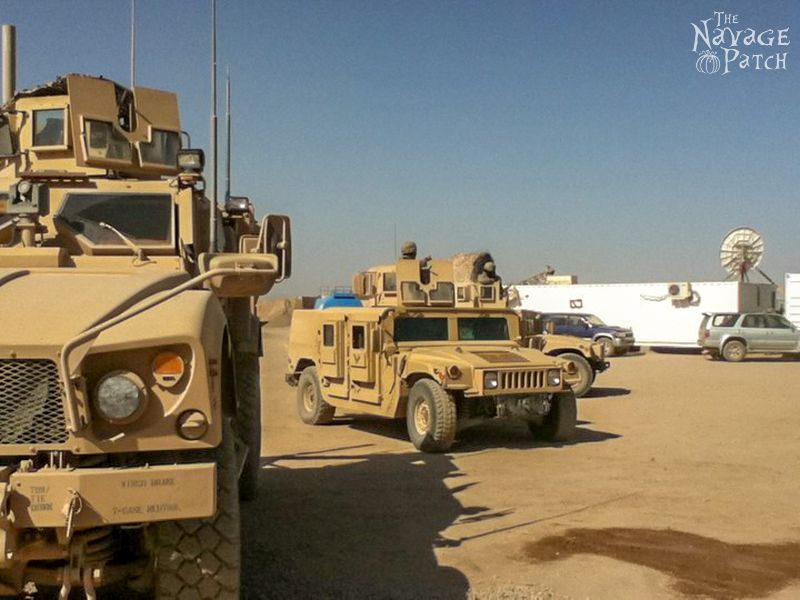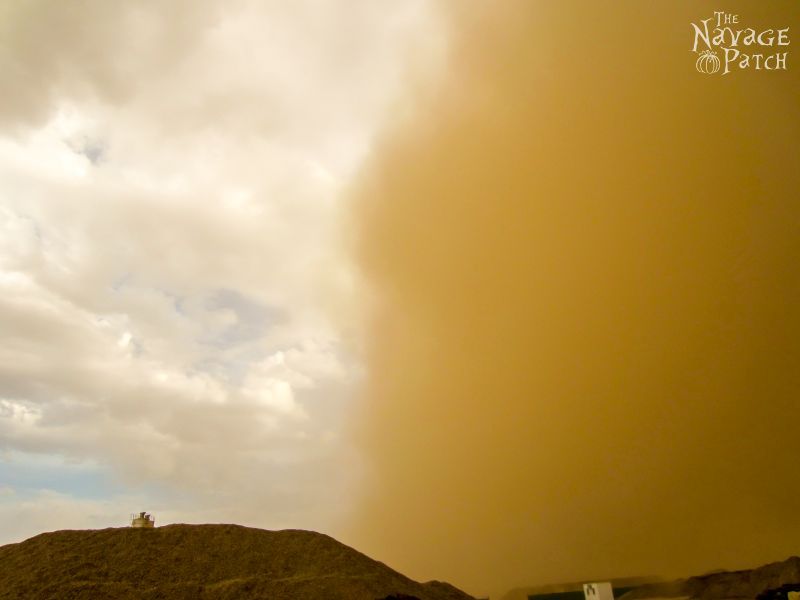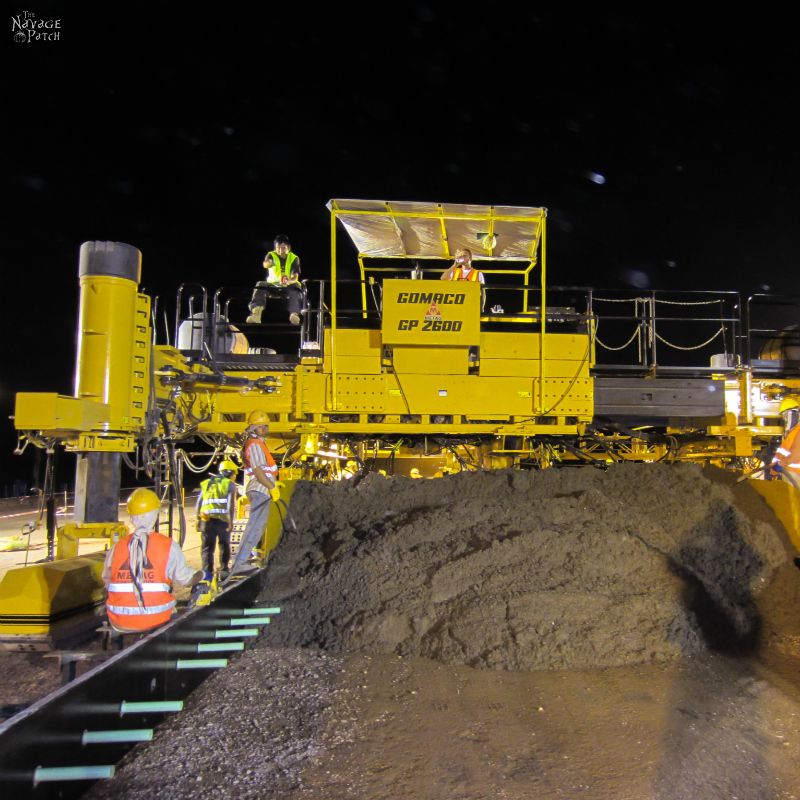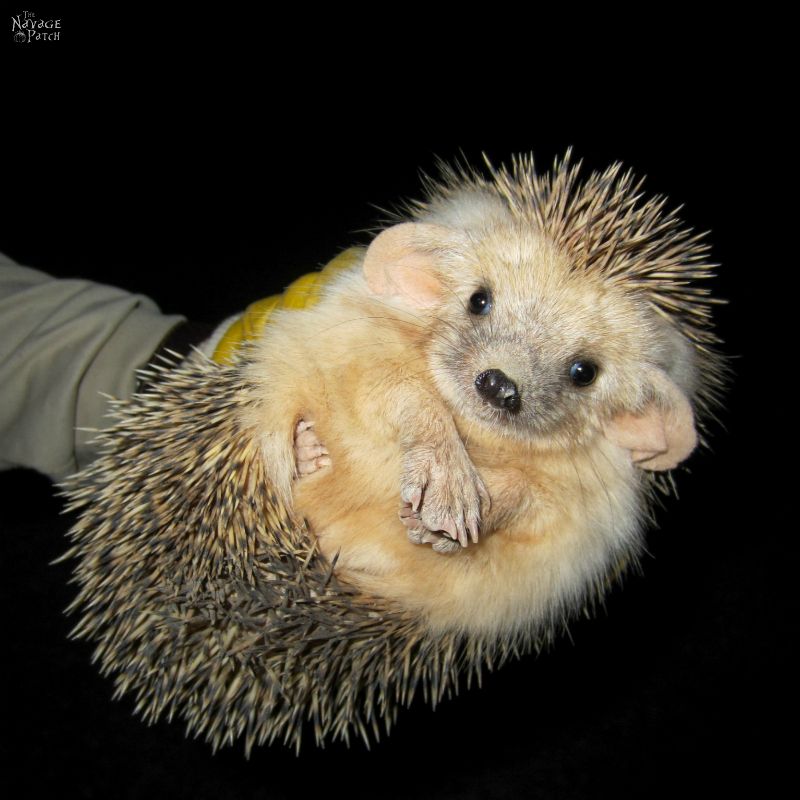Afghanistan – Part 7: Living Outside the Wire
CONTINUED FROM>> About Us >>
Life moved slower at Forward Operating Base (FOB) Shindand, at least at first. It was a small outpost that hadn’t yet achieved “Camp” status in military jargon. The base was permanent home to American, Italian and Afghan forces, with a smattering of soldiers from other allied countries thrown in at any given time. Since this was an ISAF (International Security Assistance Force) base, the demographics and composition were more varied and eclectic than Camps Bastion and Leatherneck. Shindand had a different feel. It was more laid back.
In the beginning, our job site was outside the wire, or off base. The main goal of our project was to build a taxiway off the existing runway. In order to do that, we also needed to expand the perimeter of the base. The only place close enough to the job site with enough land to accommodate our camp and the concrete batch plant was located outside the safe confines of the base’s perimeter fence. So while our company moved forward with the project, there was a period of time where we all would be living in Afghanistan proper – like nervous campers in a seedy RV park.
Of course, when we arrived at Shindand, Handan and I knew nothing of the plan to live, unprotected, in the wilds of Afghanistan. We were staying in a small camp that we shared with another Turkish company located in the Afghan National Army’s section of the base. This part of the base was patrolled by Afghan soldiers, and we had to pass through an Afghan checkpoint to get to our camp. I found that surreal. We were living in a little parcel of Afghan territory within a larger chunk of American/International territory within the sovereign territory of Afghanistan. Best not to think too hard about that. Adding to the absurdity was the fact that at that point in the spring of 2011, the Afghan forces (that US forces were training) were not allowed to have real guns. They also didn’t have much in the way of training grounds, so they would not only perform their marching drills on the road, but they would use it as an improvised classroom as well. It was hard not to chuckle when we had to drive through a phalanx of Afghan soldiers marching with wooden rifles on their shoulders or sitting in formation in the middle of the road.
We liked our cozy outpost in the little Afghan base. We had to travel outside the wire every day to do our jobs, but we returned each night to the guarded base. We had cookouts and we felt safe.

All that changed after a week or so when we were informed that everyone in our little camp had to move outside the wire. There were already many Turks living out there plus the hundreds of Afghan workers. The only people living in our protected camp besides Handan and me were a couple of Americans, some Turks, a Filipino and some Afghans who helped around camp. We thought we would be staying there until the base perimeter had been expanded to surround our work site. We were wrong.
Remember how I felt when I was in Izmir and I learned that going to Afghanistan was our only option? I had a similar reaction to learning that our only option was to move off the military base with all the nice guns and soldiers and live out in the open, mere kilometers from the Taliban hotspot of Shindand (the village, not the base).
I wasn’t alone in that reaction. We were all convinced we were going to be slaughtered in our sleep. The only protection our camp had outside the wire was a handful of hired local “security” forces: Afghans with AK-47s. They roamed around the camp day and night, keeping us safe from…other Afghans. I wondered who these people really were. I wondered where their loyalties lied. I wondered what would happen if the shit hit the fan and we were attacked. Would they help us? Would they lay down their lives for us? Or would they tuck tail and run. I was betting on the latter but hoping never to find out.
When it became clear that our protestations were getting us nowhere, we succumbed to the inevitable and prepared to move outside the wire. On the plus side, our double-wide from Bastion was already there waiting for us. Shortly after we moved in, a spring rainstorm moved through the area one night. I woke to a waterfall in our house. Until they could re-weld the roof, we tied a big tarp around our house.

You may be wondering about the fate of Jerkfish and Lola. Though I had the highest of hopes (well, the maybe the mediumest), those poor fishes-out-of-water didn’t survive the journey. I never learned of their exact fate and felt it best not to probe the matter too deeply.
Just after we moved outside the wire, one of the Afghan workers presented me with a gift. It was a beautiful traditional hat worn by Afghan men. I tried it on, but it was far too small for my over-sized melon, so I gave it to Handan.

She wears it way better than I ever could!
Though we were not protected by the base, we did have a chain link fence around our camp. The gate leading in was guarded by one or two armed Afghans. In the picture below, I’m standing on a raised area looking towards the gate to our camp. The base is in the background. The village of Shindand was to my left, not shown in this picture.

I can’t tell from this picture who that guard is, but my favorite was a guy we called One-Eyed Jack, a grizzled fighter with a patch over one eye and a leering, gap-toothed smile. Jack only spoke one word of English: hello. I “met” Jack one day when he walked up to me in camp (I was American, and therefore rather rare outside the wire. There were only three of us living out there).
“Hello!” Jack said.
“Uh, hi.” I said.
Jack pulled out his pistol and held it in front of his chest.
My man parts retreated inside my body.
Jack pointed at his pistol, then he pointed at me. He nodded his head and smiled.
I think I pooped myself.
I looked around for someone, anyone, to help, or at least witness my death and carry stories of my bravery back to my wife and family.
I saw one of my safety officers nearby. I called to him.
“Abdul Ghafar!”
Abdul Ghafar walked over. Jack stood there smiling and staring and cradling his gun.
“Abdul Ghafar, what is he doing?”
He exchanged some words in Dari with One-Eyed Jack.
“Mr. Greg, he says he will protect you.” Jack’s smile widened. He nodded with renewed vigor.
“Oh!” I said, relief overtaking me. “Thank you!” I turned and hurried away.
After that, I always had a smile and a handshake ready for One-Eyed Jack. He was a loony son-of-a-bitch, but I have no doubt that if we were ever attacked, Jack would have been the only one firing back at the enemy.
Our little outpost consisted of an office area, living containers, a storage depot, a kitchen/bakery/mess hall, an infirmary, a laboratory for analyzing concrete samples, and a mosque for the Afghan workers.

We got our electricity from a few big generators, and we stored diesel in cylindrical tanks for the generators, our personal vehicles, and all the heavy machinery we operated on the job site. One of our first orders of business at this new site was to dig a well. Not only would we need the water for bathing and toilet flushing, but we’d also need thousands and thousands of gallons for the concrete batch plant. Before the well was dug, we relied on water delivered by truck each day to a water tank. Water for cooking and drinking was delivered in bottles.
Digging the well should have been a straightforward affair. But The Powers That Be at the time thought they could cut costs by going with some fly-by-night contractor for the well. I’ve never seen a more egregious display of unbridled boobery than the one put on by the clowns we hired to dig a few hundred feet into the ground for some water. For starters, the foreman dressed in a purple and white one-piece ski suit from the 1980s with sleeve art that looked like a Jackson Pollack sneeze.

I’m no fashion snob, but c’mon! That ski suit was hideous in its heyday, and it hadn’t improved with age.
Anyway, this fashion failure and his merry band of misfits proceeded to take a week-long (at most) project and turn it into a multi-month ordeal. For starters, they seemed only to work when the fancy struck. Some days they didn’t bother to show up at all. I can’t tell what their big problem was with digging a hole. Gross incompetence was certainly a part of it. The last straw came when they broke off the drill head in the well. After another week of waiting, they were able to remove it, just in time to be removed themselves. The Army Corps of Engineers was coming down on us to have a functioning well, so The Powers That Be at last realized that flowing water was a higher priority than saving a few dollars. We hired a new contractor, completed the well, and finally had flowing water. It was one of the happiest days of our project manager’s life.

While the well drama played itself out, work continued in other areas. The fence project was moving along. We had erected all of the new fence poles and were waiting for the chain link to be installed.

Though we were living off-base, our project was commissioned by the Army Corps of Engineers, and as such, we were still subject to the Army’s rules and regulations. We were inspected by the Corps once every week or so, and they would come for meetings every Monday. Let me set the scene.
*****
It’s a warm spring morning in April. Handan and I stroll through camp, enjoying the morning air, mugs of instant coffee in our hands. I wear a short-sleeved blue button-down shirt by Quicksilver. I love their shirts. They’re so soft and comfortable. Handan wears a yellow t-shirt and jeans. Then we hear it: the unmistakable throaty growl of approaching MRAPs (Mine-Resistant Ambush Protected – like the Humvee for the modern generation) shattering the morning calm.

We smile and sigh. Here we go again.
The MRAPs park and two soldiers in full combat gear leap out of the first vehicle. They have rifles ready as they survey the area, walking briskly from point to point. Satisfied that we and our coffee are of no immediate threat, they motion for the others to exit the second vehicle. A middle-aged man in Army fatigues (our Corps of Engineers contact) and an Afghan wearing jeans and a white button-down (A local engineer hired by the Corps) emerge from the second vehicle. They wear body armor and helmets. The two soldiers get in defensive positions.
“Good morning, Walter. Good morning, Nasir.” I saunter over in my shirtsleeves and have a slurp of coffee. I glance at the armed and armored soldiers and nod my head. “Fellas.” No response. Oh well, I tried.
Handan and I walk with them to the project manager’s office for our weekly meeting, four guys in body armor on high alert and my wife and me in t-shirts with our morning joe.
Welcome to life outside the wire.
I could never decide if I should laugh at the overkill of their precautions or worry that they knew something we didn’t but still let us live out there unguarded.
*****
As summer approached, the winds picked up. There was always sand and dust flying around, but sometimes we’d get dust devils the size of small tornadoes. Here’s a big one that blew right through our living area. It picked up and tossed around a lot of crap, but didn’t do any real damage.

One afternoon I came out of my office to see this.

I left the office square to get a better look.

It was a big one, and heading straight for us. My fellow health and safety manager, Jojo grabbed his camera, too.

Moments later, it hit.

And then it was time to run inside and seal the doors and windows until it passed.
Life was good in that camp. Handan and I both enjoyed ourselves. We often had barbecues with the Turks.

We would eat lamb and goat, always fresh and usually slaughtered that very day by our camp chef. Nothing beats a freshly roasted leg!

If the leg was too much, there were always kebabs. Here’s a picture of me with our Afghan night watchman.

He was a sweet old man who walked around camp all night making sure everything was as it should be. He spoke no English, so I learned a few simple Dari phrases to greet him.
Salaam – Hello
Chasht bakhir – Good evening
Shab bakhir – Good night
Khuda Hafez – Goodbye
Even after we completed the the expansion of the perimeter fence and our camp was part of the base, he stayed on to keep us safe at night.
On the last day of April, 2011, we completed the expanded perimeter fence. It was then time to start removing the long length of the original base fence that was no longer needed. As soon as we removed the first section of chain link, the military was ready to drive in and inspect their new property.

Things changed then. We were protected and safe once again. The soldiers came through and prison-tossed all of our homes, but that was to be expected. We had been living lawless, with Afghans coming and going at will. Now that we were a part of FOB Shindand, the military had to make sure we had no contraband, weapons or stowaways. Though I was relieved we were finally a part of the base, part of me missed the adventure and uncertainty that came with living wild in Afghanistan.
CONTINUE ON TO>>







you two are so daring, but it does go to show that not all afghans are terrorists i am sorry about the fish, and i am still hoping the goats, are safe and making babies xx
Thanks, Chris! Just wait till you meet our Afghan dogs!
I am totally spellbound by your story so far. As someone who was born and has lived in the same city all my life, the life you are writing about is amazing. You have a true gift in your story-telling. Found ya’ll from Hometalk. Looking forward to the “rest of the story.”
Hi Kay, I’m so glad you found us! Thank you for reading and commenting. More to come soon!
Not only do you guys have the best story of how you met and fell in love, but the story of your first year of marriage is truly unbelievable. And cool. And lovely. And absolutely riveting.
Hey Mel! Thank you! We’re so happy you stopped by to read the story!
Thank you so much, Melissa! Yes, our first year was pretty adventurous 😀
Greg & Handan: I just found you through Hometalk. Your love story is sooo beautiful! It is quite unbelievable what you went through to be together. You are both adventurous, daring and brave to say the least. I have truly enjoyed reading all about it. I shared your story with my husband over dinner and he was equally amazed. However, you left us hanging. Greg, you are a gifted writer. Please continue your story. I look forward to future installments.
Thank you so much, Melva! I’m so happy you found us! You can expect another chapter of the story this week 🙂
Thank you so much, Melva!
Loved reading your story!! Waiting on more! Thanks so much for sharing!
Hi Jane, you know there’s more already, right? I see your comment is on Afghanistan 7, but there are 4 more in Afghanistan, then Vietnam and India. Thanks for reading!